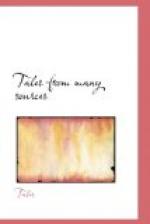THE END
Some things—such as gossip—gain in the telling, but there are others before which words fail, though each heart knows its own power of sympathy. And such was the joy of the little ladies and of Thomasina at John Broom’s return.
The sheep dog had had his satisfaction out long ago, and had kept it to himself, but how Pretty Cocky crowed, and chuckled, and danced, and bowed his crest, and covered his face with his amber wings, and kicked his seed-pot over, and spilled his water-pot on to the Derbyshire marble chess-table, and screamed till the room rang again, and went on screaming, with Miss Kitty’s pocket-handkerchief over his head to keep him quiet, my poor pen can but imperfectly describe.
The desire to atone for the past which had led John Broom to act the part of one of those Good-Fellows who have, we must fear, finally deserted us, will be easily understood. And to a nature of his type, the earning of some self-respect, and of a character before others, was perhaps a necessary prelude to future well-doing.
He did do well. He became a good scholar, as farmers were then. He spent as much of his passionate energies on the farm as the farm would absorb, and he restrained the rest. It is not cockatoos only who have sometimes to live and be happy in this unfinished life with one wing clipped.
In fine weather, when the perch was put into the garden, Miss Betty was sometimes startled by stumbling on John Broom in the dusk, sitting on his heels, the unfastened chain in his hand, with his black head lovingly laid against Cock’s white and yellow poll, talking in a low voice, and apparently with the sympathy of his companion; and as Miss Betty justly feared, of that “other side of the world,” which they both knew, and which both at times had cravings to revisit.
Even after the sobering influences of middle age had touched him, and a wife and children bound him with the quiet ties of home, he had (at long intervals) his “restless times,” when his good “misses” would bring out a little store laid by in one of the children’s socks, and would bid him. “Be off, and get a breath of the sea-air,” but on condition that the sock went with him as his purse. John Broom always looked ashamed to go, but he came back the better, and his wife was quite easy in his absence with that confidence in her knowledge of the “master,” which is so mysterious to the unmarried, and which Miss Betty looked upon as “want of feeling” to the end. She always dreaded that he would not return, and a little ruse which she adopted of giving him money to make bargains for foreign articles of vertu with sailors, is responsible for many of the choicest ornaments in the Lingborough parlour.




